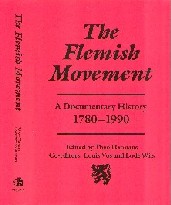Main publications
Links:
A Documenary History 1780-1990
Co-editors Louis Vos and Lode Wils
London and Atlantic Highlands (NJ): The Athlone Press, 1992
476 pages. ISBN 0 485 11368 6
Documents: James Shaw 1786, JBC Verlooy 1788, Leo de Foere 1815, PA Vandenbroeck 1817, JF Willems 1818, 1819-24, 1834, 1841, Provisional Government of Belgium 1830, Philip Blommaert 1832, Hendrik Conscience 1838, 1847, Petition 1840, JB David c.1840, FA Snellaert 1847, 1859, Gerrit de Clercq 1847, E Zetternam 1851, JB van Ryswyck 1856, Guido Gezelle 1864, Julius Vuylsteke 1865-9, Albrecht Rodenbach 1879, Jan van Rijswijck 1880, Edward Coremans 1883, Julius Macleod 1895, Walloon League 1886, August Vermeylen 1896, Lodewijk de Raet 1907, Frans van Cauwelaert 1908, 1919, 1921, 1936, Jules Destree 1912, 1929, Willem de Vreese 1913, Adiel Debeuckelaere 1917, Council of Flanders 1917, Cyriel Verschaeve 1918, Flemish Committee 1919, Ten Commandments 1922, Lodewijk Dosfel 1922, Belgian Bishops 1925, Camille Huysmans 1929, 1931, Hendrik Elias 1932, 1935, Jules Callewaert 1943, Gerard van den Daele 1947, Hendrik Fayat 1947, 1966, Max Lamberty 1948, Willem Pee 1948, Guido Declercq 1956, Herman Deleeck 1959, Maurits Vanhaegendoren 1961, Julien Kuypers 1961, Cultural Council for Flanders 1963, Raymond Derine 1964, Charles Becquet 1964, Leuven University 1968, Decree 1973, Principles 1978, Jef Maton 1983, Hugo Schilz and Robert Senelle 1984, Kas Deprez 1985, Manu Ruys 1985, Chris Vandenbroeke 1987, King Baudouin I 1988, Gaston Geens 1988, Action Committee Flanders 1990.
From the reviews:
... one of the few texts available in English on the nature and role of the Flemish Movement and the struggle for recognition of the language and the cultural identity of the Dutch-speaking inhabitants of Belgium .
History Today, March 1992
The Flemish Movement is a ‘must read’ not only for those it addresses in the first place, namely people living in the English-speaking world, but also for many a Netherlander, for whom most of this information is probably new, or has in any case seldom been presented in such a lucid, well-organized fashion. For Canadians the texts and their contexts have a special meaning. As Hermans points out in his Preface, the history of the Movement not only ‘demonstrates the sociopolitical potential of language in multilingual societies’ but above all ‘provides an object-lesson in the containment of ethnic conflict by democratic means,’ a lesson sorely needed at this critical juncture in Canadian history. [ …] Highly recommended reading therefore not only for those interested in the Low Countries , but for all students of nationalism, ethnicity, language, culture and government.
A.P. Dierick, Canadian Journal of Netherlandic Studies 13, 1992, 2
There can be no doubt about the need for this book. If there is widespread misunderstanding about the relationship of Dutch to German, there is often downright ignorance about the place of Flemish vis-à-vis Dutch (or French for that matter), and it is to be hoped that this will long be the work to which, despite its price, reference will be made to rescue the Dutch-speaking Belgians from their obscurity in this country.
Peter King, Dutch Crossing 46, Spring 1992
Voor het eerst vinden we een reeks van maar liefst 69 documenten afkomstig uit twee eeuwen geschiedenis van de Vlaamse Beweging in een Engelse vertaling. (…) Allerwege is er belangstelling voor het nationalisme en een collectie documenten uit een land waar de vorming van een ‘staatsnatie’ mislukt is en taalnationalisme ten grondslag ligt aan het federaliseringsproces maakt de uitgave alleen maar belangwekkender.
Pieter van Hees, Ons Erfdeel 35, 1992, 5
The book offers a valuable source of Flemish reflections on the state of the Dutch language and, particularly, on the conditions of the Dutch-speaking community. Thus we are able to trace the development of different conceptions of Flemish identity, from the ninteenth-century vision of a separate nationality inside that of Belgium , through flirtations with separatism and Greater Netherlandism around the inter-war years, to the new federalism of the last thirty years. The book also shows how the focus of the movement moved from the use of language as such, to the educational and legal frameworks needed to sustain and develop it, to the emergence of political self-government and, finally, to the establishment of economic control.
Clive H. Church, European History Quarterly 1993
Wie de Vlaamse Beweging wil bestuderen en geen Nederlands kan lezen, komt niet ver, al is er natuurlijk allerlei in grotere talen beschikbaar. Wie wel Nederlands kent, lijdt niet aan de beperktheid van het toegankelijk materiaal, maar aan de ontzagwekkende overdaad ervan. Het aardige van het hier ter bespreking staande boek is dat het eigenlijk beide categorieën hulp biedt, niet alleen degene die geen Nederlands kent, maar ook degene die het wel beheerst. Dat is te danken aan de grote zorg waarmee het is samengesteld.
E.H. Kossmann, Neerlandica extra muros 31, 1993, 3
This excellent book makes accessible an extensive and varied collection of documents relating to the Flemish Movement, including detailed commentary on the texts. Readers not familiar with the history of the Flemish Movement may need some more background, but the introduction does include necessary and relevant explanations. The volume stands an an important contribution to our better understanding of the explosive sensitivity of the Belgian language issue. In their diversity the numerous documents provide a comprehensive picture of the true complexity of language loyalty as it is linked to group consciousness.
Sonja Vandermeeren, Language Problems and Language Planning 18, 1994, 2


Last updated August 2008 by Theo Hermans.